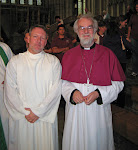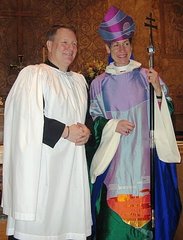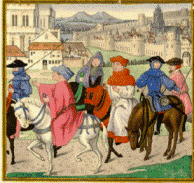Preached on Sunday, December 3, 2006 at St. James Fordham Manor, The Bronx, NY: http://stjamesf.dioceseny.org/
Lectionary readings this sermon is based on can be found at: http://www.io.com/~kellywp/YearC/Advent/CAdv1.html
So, it’s the first Sunday of Advent. You can now officially start counting the shopping days until Christmas -- if you haven’t started to already. Actually, if you watch any television at all you’ve been seeing commercials for Christmas decorations and gifts and music since Halloween and before. But, as far as the church is concerned, it’s now officially the season to begin thinking about, planning for, and anticipating the Feast of the Lord’s Nativity, more popularly known as Christmas.
So, what does our Gospel lesson give us in the way of pre-Christmas greetings? “Distress among the nations…” Doesn’t exactly sound like ‘Ho, Ho, Ho,’ does it? “People will faint from fear and foreboding…” Not exactly, “Santa Claus is coming to town” is it? “The powers of the heavens will be shaken!” Doesn’t make us want to deck the halls with boughs of holly, so much as to hit the deck and cover our heads!
The church calendar and today’s Gospel reading conflate the first important event in Christian history -- the birth of Jesus -- with the end of history. All sorts of references to the end of times are found in today’s readings. In the Old Testament reading, the prophet Zechariah says that the Mount of Olives in Jerusalem is to be split in two and the people will flee through the valley that results. Paul tells the Thessalonians to love one another and to strengthen their hearts in holiness, so that they can be blameless at the second coming of our Lord Jesus. Yes, we might be looking forward to singing “O Little Town of Bethlehem, how still we see the lie…” in a few weeks, but first our attention is drawn to the earth-shattering, heaven-shaking end of the world…
From the sound of it, I’m not looking forward to it. Wars and famine, earthquakes, and fainting with fear. You know, whenever there’s an earthquake or a flood, or a comet in the sky, someone will inevitably rush out and start proclaiming that the final judgment has come. I guess they think if the bad stuff associated with the end of the world is here, the good stuff, the return of Christ in glory, will be be coming as well. They did something like that on New Year’s Eve in the year 1999. Some people gathered on the Mount of Olives in Jerusalem sure that Jesus’ second coming would happen by the calendar. And you know what? They thought the same thing in the year 999. And all these folks down through the ages who have promised that the end of the world was now at hand -- they all have one thing in common: they were all wrong. It didn’t happen. The tired ole world rose again the next morning to get on with it, in the year 1,000 and in the year 2,000 and again tomorrow morning, I expect.
Now, don’t get me wrong. I look forward to the second coming of Christ as much as anyone who hopes and believes himself to be justified by grace and sanctified by God’s mercy. I’m not looking forward to any earthquakes or floods. But I do want to wake up in paradise, and to see the resurrection of the dead and the culmination of the story of salvation in the New Jerusalem. In fact, I’m all for the second coming of Christ, but I don’t know that I… or that any of us, really have a right to ask for it to happen on our watch.
I mean, look at what happened the first time God came to us. God gave his only begotten Son to us, and what did we do? A very few of us got to know him and followed him, and tried to understand his teachings. But most of us treated him with indifference, disdain and even contempt. We betrayed him and turned on him. When the going got really tough, we ran for our own safety and denied we ever knew him. And we were there with the rest of the crowd at the Praetorium shouting, ‘Crucify him!’ on that awful day nearly 2,000 years ago -- and we will be again in a few months here in this church when the calendar rolls around to Good Friday again…
I’m really not sure that we’d behave any better today if Christ came to us than we did 2,000 years ago. We continue to treat each other with contempt and disdain: children are dying from preventable, treatable diseases all over the world. We are the richest nation on earth and yet families still go hungry and have to search for a place to lay their heads at night. Though millions of lives have been lost in war after war -- some fought for good reasons, most for very bad reasons indeed -- we’ve still not come up with a way to settle our disputes without resorting to war.
Did you know that in the US Civil War, 95% of those who were killed were soldiers and 5% of those who were killed were civilians? But in all the wars in the 20th century combined, 5% of those killed were soldiers, and 95% of those killed were civilians. So, no matter how just or unjust are our reasons for fighting a war, every war means that everyday people are caught in the cross fire -- in every war it is the innocents who are slaughtered.
No, I’m not sure that we’re ready for the second coming of Christ. We’re not really ready for God to come in glory and power to judge us. I think we still have some lessons to learn from the first time that God entered human history and came to us in the person of Jesus of Nazareth.
Jesus taught us many things during the short time he walked among us. He taught us to take care of each other -- whether friend or stranger -- as did the Good Samaritan. In the Beatitudes, he taught us that the poor and the downtrodden and the meek hold a special place in God’s heart. He taught us to turn the other cheek when we are wronged, and that vengeance was the Lord’s, not ours. He taught us not to judge or to condemn anyone, but to forgive -- and he promised that we would be forgiven in turn. He taught us that there was nothing noteworthy in loving our friends and families, but that we should love our enemies as well. He taught us to do unto others as we would have them do unto us. He taught us by his own example to seek to serve God and only God even unto death; and no ordinary death at that, but a humiliating public execution, stripped naked and nailed to a wooden cross set up at the side of the highway into town.
No, I don’t think that we’ve quite learned all that Jesus came to teach us in his first visit among us. So, I expect it will be a while before he comes again in glory to take us to our glory. I think that like the Thessalonians, we need learn to love one another, and we need to strengthen our hearts in holiness if we are to be ready for the second coming of our Lord Jesus Christ.
You know, we really have no idea if Jesus was born exactly on December 25th. But we’ve picked that day on which to celebrate our Lord’s Nativity -- and I think it’s an interesting choice. Christmas comes on what for those of us who live north of the equator is just about the shortest day -- and longest night -- of the year. So, during Advent as we prepare ourselves for Christmas itself, the days shorten a little, and the nights get a bit longer, as each day passes.
Over the next four weeks, if you listen to the readings, and prayers and the hymns we’re likely to sing, you’ll hear references to light and darkness, to voices calling out in the wilderness and to shouts of joy. As our world gets darker, we pray for the Lord, Emmanuel -- God with us -- to come and lighten the darkness. We pray and we hope and we sing out our joy that God in mercy will send the Messiah to redeem us.
It is appropriate, in a way, that we should reflect on the second coming of Christ as we prepare ourselves to celebrate his first coming. We are, after all, the people born between the Advents, the one that came 2,000 years ago that we commemorate in December every year -- and the advent of the coming again of our Lord, the advent that has yet to come. We have very much in common with the ancient Hebrews, our ancestors in faith, who waited for thousands and thousands of years, for the first Advent, for the birth of Jesus, the promised messiah. He was born in a barn, to a young unmarried girl whose pregnant state surely garnered some hard looks for the upstanding citizens of her community. He was with us in the flesh for but a short time in which he taught, and blessed and healed. Then he ascended, and now we, along with generations of our fellow Christians wait for his coming again. Like those who waited so long for the first Advent, we must wait and watch -- and try to love one another, and to strengthen our hearts in holiness, as we look for the signs that will tell us God’s kingdom has come.
As we prepare ourselves to celebrate and welcome the coming of the infant Jesus, I invite us to think about preparing ourselves -- and our world -- for the coming again of Jesus in glory. As we think on that small vulnerable babe in the manger, I invite you to consider the thousands of babies throughout the world who will be, like him, born into poverty and squalor -- so many of whom will die from measles, malaria and other treatable, preventable diseases. As we think on the young Jewish girl who finds herself unmarried and pregnant, I invite you to think of the many young women in our own city who will find themselves in similar straits, from a lack of family planning resources, or perhaps from a lack of any dream larger than that of having a baby while still just a baby herself.
When you think on the miracle that God should be born in our midst, a member of a despised nation born into mean circumstances in a backwater of the Roman Empire, I invite us to be joyous in the knowledge that God did not stoop down to take on our humanity, but rather God became human in Jesus Christ to raise us up, to remind us that we are all made in God’s image, and that we are all blessed by the light of Christ -- even in our darkest nights, maybe especially on our darkest nights. And not only are we blessed by the light of Christ, but all humanity forged in the image of God is sister and brother to Jesus himself, and to us. And that all the innocents slaughtered, all the pregnant teenage girls, all the homeless, poor and orphaned around the world are to us sisters and brothers, and those whom we should serve as Christ has served us: in his incarnation, in his teaching, in his death on the cross. And know that Jesus is ever with us in the words of scripture, where the life of Jesus is given to us to reflect on, and the teachings of Jesus are given us to ponder and take into our hearts -- to make incarnate within us. Christ came once and is with us still through the presence of the Spirit in our lives and in our hearts -- and Christ is with us in the presence of those in need as well. As the Spirit abides with us always, so too does Jesus, a constant companion through all our darkness.
In this Advent season may we all prepare our hearts to accept the love of God in the gift of the life and person of Jesus; and may we help all the world prepare for his coming again, in justice and mercy, in judgment and forgiveness, in glory and in awesome power.
Amen.
© 2006 by Mark Robin Collins
20 December 2006
Sermon for Year C, Advent 1: "Getting Ready For The King"
Subscribe to:
Post Comments (Atom)







No comments:
Post a Comment